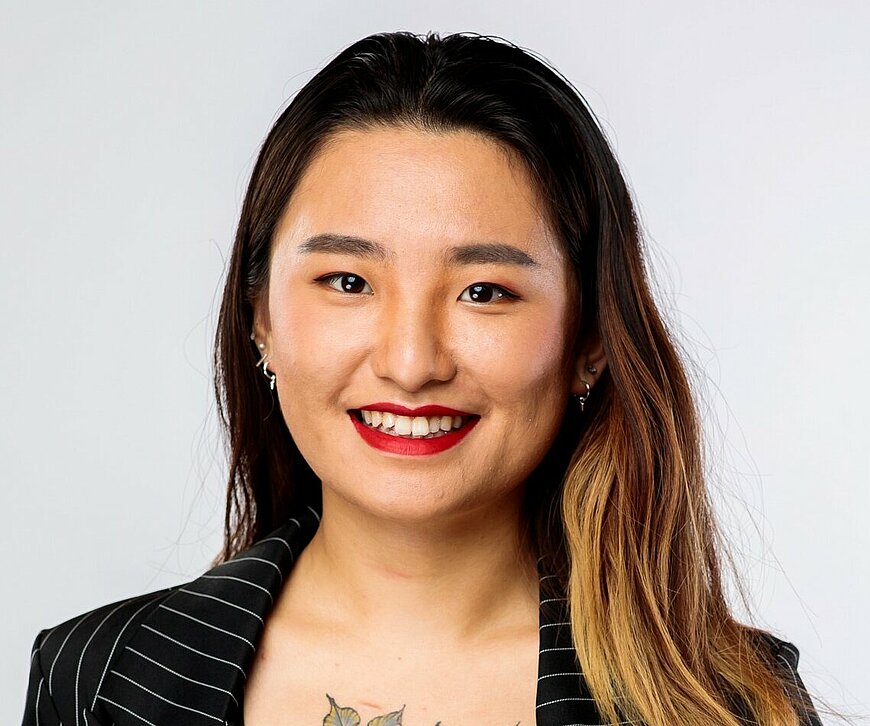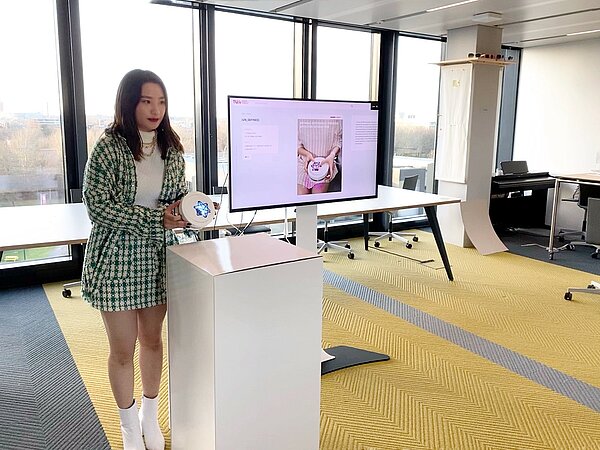Meet our pioneer: Tianyi Chen

In Brainport Eindhoven we are changing the world because here we develop key technologies that change society. We can only do this thanks to our pioneers. So we would like you to meet one of our pioneers: Tianyi Chen.
Who are you?
I am Tianyi Chen. I am 23 years old and I am originally from China.
What do you study?
In China, I did a bachelor's degree in Mechatronics Engineering at Zhejiang University. Now I am doing the master of Industrial Design at the TU/e.
Why did you choose this study?
Ultimately, I thought Engineering had a too specific goal: to improve technology. I think it's more important to discuss how we deal with technology, how people are affected by it. That’s why I was more comfortable with the Industrial Design study.
"I think it is more important to discuss how we deal with technology, how people are affected by it."
I find it fascinating to think about future scenarios of design. It’s not strictly about design, but how we are going to use new technologies such as AI and biotechnology? How do we shift our mindset, social norms and cultural beliefs and rules? I think that’s very interesting and I think the power of design is very strong. We've seen in the past that some of these technologies are neutral, but what matters is how people use the technology. Just look at deepfake. If you use that wrong, you can cause a lot of problems. Designers have the resources and capabilities to envision these future scenarios to help get the audience thinking. I think design makes us more aware of what we are doing. That's why I think design is so cool.
Why did you choose TU/e?
I’m adventurous and so studying abroad was an option. After an exchange with Stockholm, I found Europe interesting, so that's why I decided to study in Europe. Industrial Design in China is also more practical than conceptual. I don't have a background in design and that's partly why I don't stick to the design rules. I want to have the freedom to explore things. I like pushing the boundaries and shaking them up.
"I want to have the freedom to discover things. I like to push the boundaries and to shake them up."
Which student team are you in?
I'm in Team Ignite together with Katja van Weert. There I do the design of the light interaction for a specific project for GLOW.
Why did you join Ignite?
Initially, I joined the GLOW community. I've seen a lot of videos on YouTube and I liked them. Unfortunately, due to corona, I have never been to GLOW in Eindhoven. But I think it’s part of the city. The light installations are not only a form of art, but they also have a greater impact. It blends into the environment if you place it in the city. It creates a different experience for every visitor. This way people can see the city differently. It also helps people connect.
Through the GLOW community, I became acquainted with Team Ignite. They were working on a ballroom project and because I love dancing so much, I wanted to be a part of it. For me, it's just a side project I'm working on. It offers me a good opportunity to work on a light installation. But I do feel like part of the team. Everyone is very nice and it's a lot of fun.

Are you also working on another project?
Now I’m working on a research project in which Machine Learning predicts the mood of the users. In this research, I discuss the impact on people's perception and behaviour. Do they accept and trust Machine Learning and will they consciously adjust their behaviour? I developed a fake app for that. I gave the participants a scenario as if the app works. They have to fill in personal information such as how they feel, how much they sleep, what they eat and what they do. After three days, I showed them a prediction in the form of AR (Augmented Reality), as a kind of Snapchat filter. That prediction indicated that they would be unhappy. In an interview, I asked what they experienced and what they thought about it. Some of them saw no explanation as to why this was predicted and some others did. I want to know whether an explanation also affects their perception and trust.
Why did you choose this topic?
It's a more speculative design. And how critical. I get a kick out of that. It's more about creating a scenario in which people are immersed, on which they can reflect directly. I find that very interesting. That's why I chose future, non-existent scenarios. I love social psychology theories and I am fascinated by how people work. This topic fits right in. Where do people stand in technology?
What do you want to do next?
I'm not yet sure what I want to do. I do want to work in the Netherlands. I think Eindhoven is a good working environment and a good balance between work and private.
It would be very interesting to work in a studio or consultancy that collaborates with organizations, large companies or start-ups. I would like to create future scenarios, to encourage others to overthink things. I want to give design advice, to help them to think better about their business and design strategy.
I would love to work with non-profit organizations. I am quite concerned about major social problems, such as climate change. By working with non-profit organizations and governmental agencies, I can help change the world a little. But there are many interesting things to discover. I just have a wide range of interests.
"I think Eindhoven is a good working environment, where there is a good work-life balance."
What do you find important about a later job?
I think it's important to contribute to a better world. I like to use design to think about special problems, such as societal challenges. I also like to discover how the language of designers works. And how we can move from more conceptual work towards the market. You can then have better discussions if it is not too abstract. I want to help with this.
"I think it is important to contribute to a better world. I would like to use design to think about special problems, such as social challenges."
What do you think about studying and living in Brainport Eindhoven?
I think Eindhoven is so small and ‘gezellig’. I used to live in big cities and it's always busy there. Here it feels like everyone is closer. You can ride your bike to your friends in no time. That makes me more relaxed. When the weather is nice, everyone goes to the terrace to have a drink, chat and enjoy the sun. The vibe is good here. The word ‘gezellig’ describes it best. I feel very comfortable here.
Where I grew up everything was results-oriented and your studies came first. I didn't feel comfortable with that. I was afraid that I would lose other perspectives if I had such tunnel vision. All my friends here have a better balance in study and life. This is how I learn to occasionally take the time to think things over. That is a big difference with China. Here you have more freedom and they are less judgmental. You can make your own choices here and everything is fine. As long as you have a reason, people respect that. Sometimes I feel like in China the society decides what you do. Of course, they mean well, but I'm more of a free spirit, who wants to have the time to explore and not keep up with the majority.
"Here you have more freedom and they are less judgmental. You can make your own choices here and everything is fine. As long as you have a reason, people respect that."
And in terms of study, I honestly think I'm good at what I do. I have the confidence to present what I do to others and ask for feedback. As a result, I speak to different people with different expertise at the university. That's pretty nice.
What else would you like to tell international students in Brainport Eindhoven?
When I came here I was quite concerned that there would be a language barrier. But everyone is very nice, polite and speaks English very well. But learning Dutch helps you understand the culture and strengthen your bond with friends and others. Eindhoven is a cool place to be. Especially if you're into design or technology. I can imagine that there are many possibilities here, so studying here is a good choice.